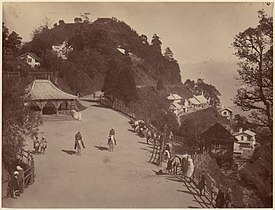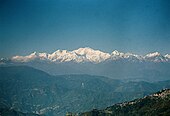Chowrasta (Darjeeling)
 Chowrasta (Band Stand), Darjeeling in 1880 | |
| Former name(s) | Band Stand |
|---|---|
| Maintained by | Darjeeling Municipality |
| Location | Darjeeling, West Bengal, India |
| Postal code | 734101 |
| North | Sikkim |
| East | Kalimpong, Bhutan |
| South | Kurseong |
| West | Nepal |
| Construction | |
| Completion | c. mid18th century |

Chowrasta (Translation: where four roads meet) is a historical public square in the Victorian era hill resort town of Darjeeling in the state of West Bengal, India. Located in the heart of the town it was the fashionable place of assembly for residents and visitors in the 18th Century. Chowrasta is situated on the ridge of the Darjeeling hill range and is now a focal center of tourist attraction and a popular spot for the residents to assemble, leisure or just stroll in the tranquility that that part of the hill station offers.[1][2]
Geography

1mile
Mountaineering
Institute
TE: tea estate, F: facility, T: religious place, I: institute
Abbreviations used in names – TE for Tea Estate
Owing to space constraints in the small map, the actual locations in a larger map may vary slightly
All places marked in the map are linked in the larger full screen map
Chowrasta is perched at an altitude of 2,134 metres (7,001 ft) and on a clear day, one can see Mount Kanchenjunga the third highest mountain in the world and twelve other peaks of the Himalayan Range, all which are above 20,000 feet (6,100 m). It came into being during the Victorian era in the mid 18th century owing to Darjeeling's cool climate, which was similar to that of London, the British established a hill station for its officials there.
The square is lined with old yet prominent heritage stores (the oldest being Oxford Book & Stationery) towards the west and an open vista of rolling hills, snow peaks and shadowed valleys on the east, all under a deep blue sky surrounded by very old pine trees.
Numerous benches are dotted all around the promenade for people to sit and watch 'life go by' (local or native residents were refrained for sitting on these benches during the British rule in India). Although it is closed to all vehicles, Chowrasta is well connected to Darjeeling town and is at an accessible proximity from all parts of the Darjeeling hill range.[3] Two main road arteries of the town, Nehru Road and Dr Zakir Hussain Road, culminate at Chowrasta and so do the two ends of Mall Road which winds around Observatory Hill and Mahakal Temple. Both ends of the Mall Road meet at Chowrasta from the north. There are few other narrow roads and footpaths which terminate and originate at Chowrasta.[2][4]
Social and tourist significance
Chowrasta is the heart and social center of Darjeeling and it witnesses many social, cultural, educational and political activities throughout the year. Few coffee shops and restaurants have mushroomed around it over the years and with mobile vendors on foot selling tea and snacks on the square itself. During tourist season one can enjoy a leisurely pony ride on the Mall Road.[5]
Statues, monuments and developments
Bhanu Bhakta statue
On the far North of the square stands a good sized golden concrete statue of Nepali poet Shri Bhanubhakta Acharya stood a brown granite plinth facing the open flat as if to watch over the souls who visit there. Initially, a 'bust above' statue of the Acharya was erected on 17 June 1949 and a full life sized figure reinstalled on 13 July 1996, commissioned by the Nepali Sahitya Sammelan.
In 2014 a park located behind the statue (North) was developed into a stepped concrete platform to give way for public events.[2]
Water fountain and Hawa Ghar
Immediately after the entrance from Nehru Road (South end of Chowrasta) is a water fountain ornamented with concrete golden colored fishes (perhaps koi) and pelicans, however the fountain ceased to operate or spout water since long due to the scarcity of water in Darjeeling.
The Hawa Ghar (translation: wind house) is a permanent roofed concrete stage like structure on the east edge of Chowrasta where cultural programs, performances and the occasional political speeches take place (historically local political speeches are limited to Chowk Bazar, a less glamorous part to town).[2]
Pigeons

Chaurasta, like all city squares has its share of pigeon population and feeding them is still a popular activity among the elderly and the tourists. Their droppings disfigure the Bhanubhakta statue and other stonework and the birds not considered a health or public hazard yet.[2]
See also
Gallery of pictures
References
- ^ "Return of the queen". hinduonnet.com. 26 September 2007. Archived from the original on 26 September 2007. Retrieved 17 August 2018.
{{cite web}}: CS1 maint: unfit URL (link) - ^ a b c d e win7. "Darjeeling Mall, Chowrasta". www.darjeeling-tourism.com. Retrieved 16 August 2018.
{{cite web}}: CS1 maint: numeric names: authors list (link) - ^ "chowrasta and the mall - ixigo trip planner!". www.ixigo.com. Retrieved 15 August 2018.
- ^ "Darjeeling, Hill Station Darjeeling, hill stations in India, Hill Stations in West Bengal, scenic places, tourism". tourism.webindia123.com. Retrieved 17 August 2018.
- ^ Guides, Bluworlds; Das, Joydip. Darjeeling Pocket Travel Guide. Bluworlds Guides.






